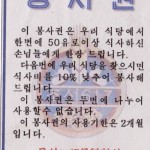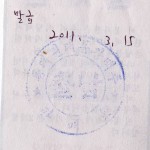In early March, the United States State Department made a statement that attracted surprisingly little attention worldwide, estimating that government-sponsored narcotic production in North Korea seemed to have decreased considerably. At the same time, the statement made clear that the private production of drugs was on the rise.
This fits with what the present author has heard recently – often from sources inside North Korea; it seems that North Korea’s drug industry is changing, and this change might have important consequences for the outside world.
The story of North Korea’s involvement with the international narcotics trade began 35 years ago. In 1976, Norwegian police intercepted a large shipment of hashish in the luggage of North Korean diplomats. The same year, another group of North Korean officials was found in possession of the same drug by Egyptian customs; they had 400 kilograms of hashish in their luggage.
In both cases, diplomatic passports saved them from any formal investigation. Next year, North Korean diplomats were caught trying to smuggle drugs into Venezuela and India. In India, quite friendly to North Korea in those days, the 15 kgs of hashish was transported by the ambassador’s secretary. After that, such seizures became regular occurrences, usually once every year or two, and usually involving North Korean diplomats.
North Korea’s narcotics program has always appeared strange to outside observers – “strange” even if judged by the standards of Pyongyang, whose leaders do not care much about legal niceties and international reputation, and perceive international politics as a cut-throat, zero-sum game. On balance, state-sponsored drug production has done much more harm than good to Pyongyang.
Available estimates agree that the North Korean government didn’t earn much from pedaling illicit drugs. It is even possible that these risky operations were largely waged to sustain North Korean missions overseas – from the mid-1970s such missions were required to pay for their own expenses.
At the same time, the existence of this program inflicted serious damage on Pyongyang’s international standing, which was at rock-bottom anyway. Despite all denials of official involvement, the program could not really be hidden because seizures of narcotics carried by North Korean diplomats and officials happened far too often and sometimes in countries that were relatively sympathetic to the North.
So, if analysts at the State Department are to be believed, North Korea seems to have come to its senses and stopped or, more likely, significantly reduced its narcotics production. Indeed, this program seems to belong to the strange and slightly bizarre world of the foreign policy of North Korea in the 1970s. After all, those were the times when North Korean agents were busy kidnapping Japanese teenagers to become living tools for the training of agents (and when US$200 million was spent propagating the juche(self-reliance) ideology in the Third World).
However, this doesn’t mean the world should heave a collective sigh of relief and write off North Korea as a potential source of dangerous narcotics. If anything, the situation has become worse over the past five to six years. But this time, the North Korean regime seems to have little or no responsibility for the new boom in drug production.
The change in the North Korean drug industry essentially mirrors the wider changes that in the past two decades have occurred in the North Korean economy and society at large. The state-run Stalinist economy essentially collapsed whilst private business took over – usually unrecognized by the state, technically illegal in most cases, completely absent from official statistics, but powerful nonetheless. This happened in all industries, and drugs production was not an exception.
The author interacts with North Koreans quite frequently and most of my contacts are people from the northernmost part of the country, from areas adjacent to the Chinese border. They are unanimous: around 2005 to 2006, these areas experienced a sudden and dramatic upsurge in drug usage, hitherto almost unknown to the common public.
It’s true that some opium productive capacity existed in the northeastern parts of Korea since the early 1900s. This is also the region where secret state-run plantations were rumored to be located in the 1980s or early 1990s. However, in the North Korea of the Kim Il-sung era, surveillance was tight and exceptionally efficient, so drug problems were for all practical purposes non-existent within the country. The drugs were produced for export and medical purposes only.
Things began to change around 2005; by that time North Korea had undergone what is usually described as “grassroots capitalism” or “marketization from below”. The old state-run economy had come to a complete standstill, so most North Koreans started to make a living through all sorts of private economic activities – from cultivating private fields and working at private workshops to smuggling.
Official corruption became endemic, so officials became more than willing to turn a blind eye to all sorts of illegal activities as long as they received their cut. Arguably, North Korea nowadays might be described as the most corrupt country of East Asia: every interaction with authorities requires payment, and if the payment is sufficient, almost everything is possible.
This social and economic situation has made the large-scale private production of drugs possible. The new North Korean drug scene is dominated by “Ice” (crystal meth), a synthetic substance produced in numerous small workshops. It is frequently mentioned by defectors, while references to other drugs are quite rare.
Most of my North Korean interlocutors, some former Korean People’s Army officers, believe that methamphetamines were initially produced officially, but not so much as a drug in the strict sense, rather as a stimulant for elite military units. This seems to be plausible – after all, it was used as such during World War II by both the Axis and the Allies.
However, after around 2005 private production of Ice began and soon became large-scale. There are rumors about occasional state involvement with illicit production of drugs for export, but even if those rumors are true, the state-sponsored labs clearly produce only a small fraction of the total. Most of the labs are private nowadays.
Raw materials are often imported from China, and China has also become a major market for North Korean drug manufacturers. Since law-enforcement in North Korea is so lax (at least when no political issues are involved), it is easier and safer to run a drug workshop there, on the southern banks of the Tumen River.
The Ice-producing labs are difficult to hide since the production is smelly. Usually, such labs operate at some distance from living quarters, somewhere in the mountains or at a non-operational factory. (Admittedly, such factories are not in short supply in post-crisis North Korea).
In many cases, there are joint operations of Chinese and North Korean criminal groups: the Chinese provide the necessary supplies while the North Koreans use their territory as a safe haven to process drugs that are later shipped to China.
However, some narcotics remain in North Korea, where drug usage has increased dramatically. My interviewees say that at least in the cities of the borderlands a significant proportion of younger people have had some experience with Ice. A schoolteacher from a borderland city of Musan recently told me that in 2008-09 most of the students in their final years of high school tried Ice.
But the problem is not limited to the borderlands. A few months ago, a colleague of mine whilst visiting a prestigious college in Pyongyang spotted a poster that warned Pyongyang students about the dangers of drug use. Merely a few years ago, such a poster would be both unthinkable and unnecessary.
It seems this development has begun to worry the Chinese. In the past few years, Chinese media occasionally write about crackdowns on drug dealers in China’s northeast, often explicitly mentioning their Korean connection. Last summer, Chinese media reported that a fleet of high-speed boats, operated by the Chinese police, had begun to patrol the rivers on the border with North Korea. The task of this squad is specifically to fight drug smuggling.
The “new” North Korean drug problem is relatively local and small in scale, although it might have sufficiently grave consequences for North Korea itself, as well as for some adjacent areas of China and Russia. It also might be seen as an indication of a new type of problem that North Korea might create.
In the past, most troubles related to North Korea were caused by the North Korean government that demonstrated an inclination to flout international laws and conventions (sometimes this inclination was strengthened by remarkable adventurism). Nowadays, problems are increasingly caused by the inability of this government to control what is happening in the country – at least outside of Pyongyang and some major cities. In the long run, the lawlessness of uncontrolled private profiteers might prove more dangerous than the Machiavellian adventurism of dictators.


